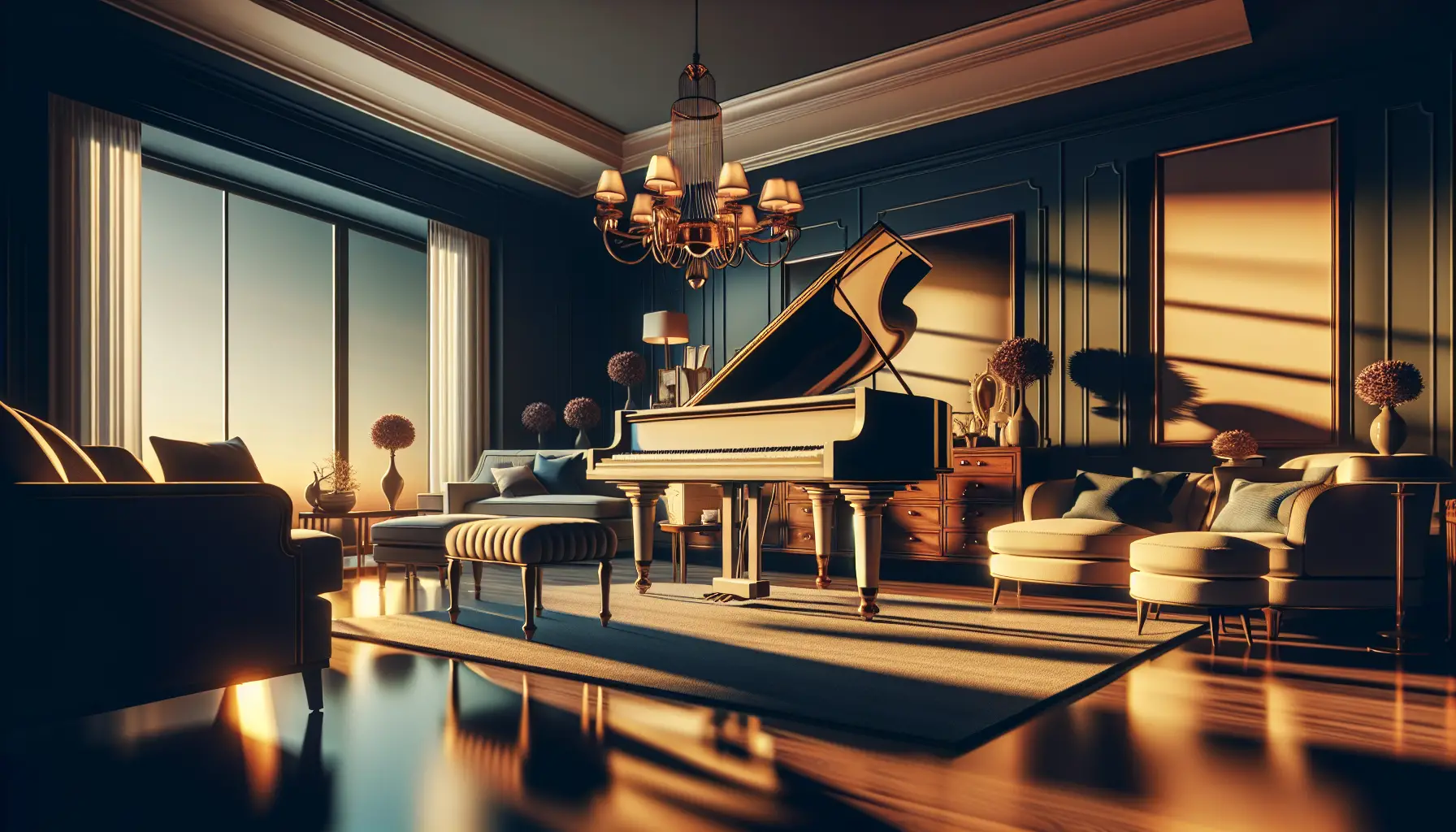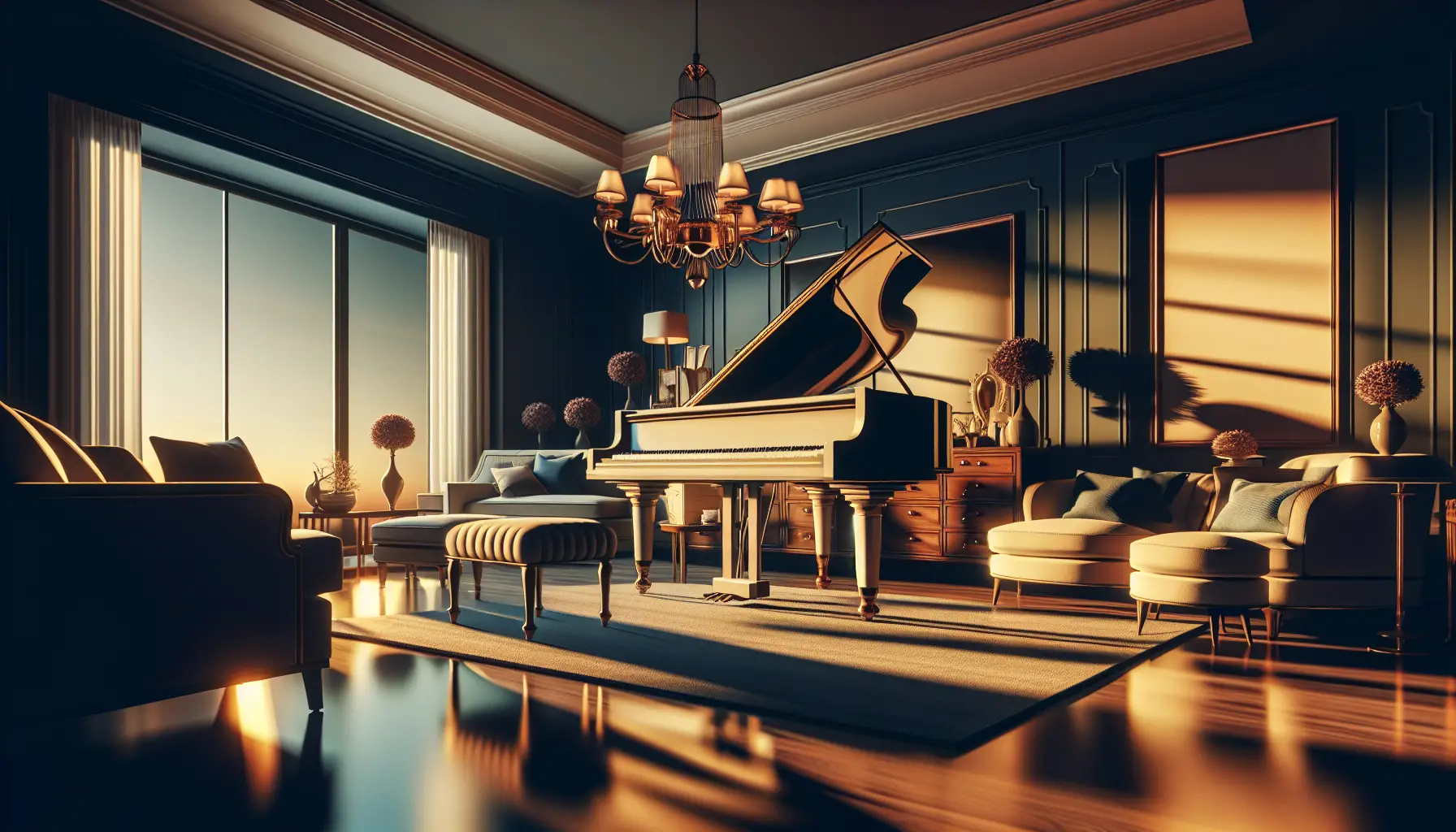So, you’ve decided that you want to invest in a baby grand piano, but you’re not quite sure where to start. Buying a used instrument can be a great way to save some money, but it can also come with its own set of challenges. In this article, we’ll walk you through the process of buying a used baby grand piano, helping you navigate through the key considerations, potential pitfalls, and expert tips to ensure you make a wise and fulfilling purchase. Whether you’re a seasoned musician or a first-time piano owner, we’ve got you covered on your quest for the perfect instrument.
Research and Planning
Before embarking on your journey to buy a used baby grand piano, it’s essential to do your research and plan ahead. This will ensure that you make a well-informed decision and find the perfect piano for your needs. Here are some key steps to follow during this stage.
Set a budget
First and foremost, determine your budget for purchasing a used baby grand piano. This will give you a clear idea of what you can afford and help narrow down your options. Consider how much you are willing to spend, taking into account factors such as the piano’s age, condition, and brand.
Understand different types of baby grand pianos
Baby grand pianos come in various sizes, each having its unique characteristics and sound. It’s crucial to educate yourself about the different types available in the market, such as petite baby grand, medium-sized baby grand, and concert baby grand. Understand the differences in size, sound projection, and suitability for your space.
Research reputable sellers and dealers
Take the time to research and identify reputable sellers and dealers of used baby grand pianos. Look for retailers with a good reputation for selling high-quality instruments and providing excellent customer service. Read reviews, seek recommendations from professionals, and explore online marketplaces known for their reliability.
Consider your space and requirements
Before purchasing a used baby grand piano, consider the space available in your home or studio. Measure the dimensions of the room and determine where the piano will be placed. Additionally, think about your specific requirements, such as the piano’s aesthetic appeal, color, and compatibility with your interior design.
Inspecting the Piano
Once you have narrowed down your options and found a potential used baby grand piano, it’s time to inspect it thoroughly. This will help you determine if the piano is in good condition and meets your expectations. Here are some important aspects to consider during the inspection process.
Check the overall condition
Begin by carefully inspecting the overall condition of the piano. Look for any signs of damage, such as scratches, dents, or cracks in the cabinet. Ensure that the piano is structurally sound and free from any major defects that could affect its performance and lifespan.
Examine the soundboard and strings
The soundboard and strings are critical components of a baby grand piano. Gently tap each key and listen for any buzzing or rattling sounds, which could indicate problems with the soundboard or loose strings. Inspect the strings for signs of rust, wear, or breakage that may affect the piano’s sound quality.
Evaluate the action mechanism
The action mechanism of a piano refers to the intricate system of keys, hammers, and other moving parts that produce sound when the keys are pressed. Check if the action mechanism is smooth and responsive. Press each key and observe if it returns to its original position swiftly and uniformly.
Inspect the cabinet and finish
The aesthetic appeal of a baby grand piano is an important consideration. Carefully inspect the cabinet and finish for any scratches, marks, or discoloration. Additionally, check if all parts of the cabinet, including the legs, lid, and pedals, are intact and functioning properly.
Testing the Piano
To ensure that the used baby grand piano you are considering is in optimal playing condition, it’s crucial to test it thoroughly. Playing the piano will allow you to assess its sound quality, responsiveness, and overall performance. Here are some factors to consider during the testing phase.
Play each note and check for consistent sound
Sit down at the piano and play each note individually, going up and down the keyboard. Listen carefully for any variations in sound, such as notes that sound muted, too bright, or out of tune. A well-maintained piano should produce a consistent and pleasing tone across all keys.
Evaluate the sustain and resonance
Pay attention to the sustain and resonance of the piano. Press down the sustain pedal and hold a chord or individual notes for several seconds. Listen for a smooth, lingering sound without any disruptions or unexpected vibrations. A high-quality baby grand piano should have excellent sustain and resonance.
Assess the key responsiveness and touch
The key responsiveness and touch of a piano are crucial for a pianist’s playing experience. Press each key with different levels of intensity, from soft to firm, and observe how the piano responds. Ideally, the keys should feel balanced, with a consistent weight and springiness.
Check for any tuning and octave inconsistencies
While testing the piano, pay attention to any tuning inconsistencies or octave abnormalities. Play chords and intervals to check if they sound harmonious and in tune. If you notice any significant discrepancies or notes that sound noticeably off, it could indicate underlying issues with the piano’s tuning stability.
Seeking Professional Help
Even if you have thoroughly inspected and tested the used baby grand piano, it is always a good idea to seek professional help before finalizing your purchase. Consulting a piano technician or expert will provide you with valuable insights and ensure that you are making an informed decision. Here’s what you should do.
Consult a piano technician or expert
Arrange for a piano technician or expert to inspect the piano you are interested in. They have the knowledge and experience to identify any hidden issues that may not be apparent to an untrained eye. Their expertise will help you gain a comprehensive understanding of the piano’s condition and any potential maintenance or repair needs.
Request a thorough inspection report
After the piano technician or expert has completed their inspection, request a detailed inspection report. This report should outline any existing or potential issues with the piano, including the action mechanism, soundboard, strings, cabinet, and other crucial components. The report will serve as a valuable reference before making your final decision.
Get an expert opinion on the price and value
In addition to inspecting the piano, seek the piano technician or expert’s opinion regarding the piano’s price and value. They can provide an objective assessment, taking into account various factors such as the piano’s age, condition, brand, and market value. Their opinion will help you negotiate a fair price and ensure that you are getting a piano worth its value.
Negotiating and Finalizing the Purchase
Once you have gathered all the necessary information and have the expertise of a piano technician or expert, it’s time to negotiate the price and terms of the purchase. Here are some key steps to follow during this crucial stage.
Compare prices from different sellers
Before engaging in negotiations, research and compare prices from different sellers. This will give you a better understanding of the market value for used baby grand pianos and help you determine a reasonable offer. Consider the piano’s condition, age, brand, and any additional services or warranties offered by the seller.
Negotiate the price and terms
Use the information you have gathered during your research, inspections, and consultations to negotiate the price and terms of the purchase. Be prepared to defend your offer based on the piano’s condition and any necessary repairs or maintenance it may require. Negotiating with the seller is essential to ensure a fair deal and secure the best possible price for the used piano.
Request a sales agreement or contract
Once you have reached an agreement with the seller, it is essential to put everything in writing. Request a sales agreement or contract that clearly outlines the terms of the purchase, including the price, payment method, any included accessories or services, and any warranty or return policy. Review the agreement carefully before signing to ensure that you are protected as a buyer.
Arrange transportation and delivery
After finalizing the purchase, make sure to arrange transportation and delivery for your used baby grand piano. Seek professional piano movers who specialize in transporting delicate and valuable instruments. Work closely with the moving company to ensure that the piano is handled with care and that it is properly protected during transit.
Considerations for Used Pianos
Buying a used baby grand piano comes with its unique considerations. Take the following factors into account to make an informed decision.
Research the age and history of the piano
When buying a used piano, it’s important to research its age and history. Find out the year it was manufactured and any relevant details about its previous owners, maintenance, or repairs. The piano’s age can affect its sound quality, durability, and potential depreciation in value.
Inquire about previous maintenance and repairs
Ask the seller or dealer about any previous maintenance or repairs that have been performed on the piano. Knowing the history of the piano’s upkeep will give you insights into its condition and the level of care it has received. A piano with a well-documented maintenance history indicates that it has been properly cared for and may be a more reliable choice.
Consider the warranty and return policy
When purchasing a used baby grand piano, it’s crucial to inquire about any warranty or return policy offered by the seller. Some reputable dealers may provide a limited warranty that covers certain repairs or maintenance for a specified period. Understanding the warranty terms and conditions will give you peace of mind and protection against any unforeseen issues.
Preparing for the Purchase
Before the piano arrives in your home, take the time to prepare and ensure a smooth transition. Here are some important steps to consider.
Measure the available space in your home
Before the piano’s arrival, measure the available space in your home where the instrument will be placed. Ensure that the dimensions of the piano align with your designated location, considering factors such as height, width, and depth. This will help prevent any difficulties or surprises when the piano is delivered.
Ensure proper placement and environment for the piano
Create an optimal environment for your used baby grand piano by considering factors such as room temperature, humidity levels, and placement within your home. Keep the piano away from direct sunlight, heating or cooling vents, and areas prone to high humidity. An ideal environment will help maintain the piano’s condition and ensure its longevity.
Confirm the need for additional accessories
Consider whether you need any additional accessories for your used baby grand piano. Accessories such as a piano bench, cover, metronome, and lamp can enhance your playing experience and protect the instrument. Confirm with the seller whether any accessories are included as part of the purchase, or make arrangements to acquire them separately.
Transporting and Setting Up
Proper transportation and careful setup are crucial to ensure the safety and integrity of your used baby grand piano. Follow these steps to ensure a successful and hassle-free process.
Hire professional piano movers
When it comes to transporting a delicate and valuable instrument like a baby grand piano, it’s crucial to hire professional piano movers. These experts have the necessary equipment, knowledge, and experience to handle the piano safely and securely, minimizing the risk of damage during transit. Research and choose a reputable moving company with a proven track record of transporting pianos.
Protect the piano during transportation
Before the piano is loaded onto the moving truck, ensure that it is adequately protected. Cover the piano with blankets or specialized piano covers to prevent scratches, dents, or other damage during transit. Additionally, make sure that the piano is tightly secured to prevent any movement or shifting during transportation.
Coordinate with the moving company for setup
Communication is key when coordinating with the piano moving company for the setup. Provide them with clear instructions regarding where the piano should be placed in your home. Discuss any potential challenges such as staircases or narrow hallways that may require special considerations during the setup process. Work closely with the moving company to ensure a smooth installation.
Ensure proper tuning and adjustments
After the piano has been transported and set up in your home, it’s crucial to have it tuned and adjusted by a professional. Changes in temperature and humidity during transportation can affect the piano’s tuning. Schedule an appointment with a qualified piano tuner to bring the instrument back to optimal playing condition.
Caring for Your Used Baby Grand Piano
To ensure the longevity and performance of your used baby grand piano, proper care and maintenance are essential. Here are some guidelines to follow.
Regularly clean and dust the piano
Dust and dirt can accumulate on the surface of the piano, affecting its appearance and potentially causing damage. Regularly clean the piano using a soft cloth or feather duster to remove dust and prevent the build-up of grime. Avoid using any harsh chemicals or abrasive materials that may damage the piano’s finish.
Maintain optimal humidity levels
Humidity levels can significantly impact the condition of a piano. Keep the room where the piano is located at a consistent humidity level of around 40-50%. Sudden changes in humidity can cause the wooden components of the piano to expand or contract, leading to tuning and structural issues. Use a humidifier or dehumidifier to maintain a stable environment.
Schedule regular tuning and maintenance
To keep your used baby grand piano in its best playing condition, schedule regular tuning and maintenance appointments with a professional piano technician. Ideally, pianos should be tuned at least once or twice a year, depending on usage and environmental factors. Regular tuning will ensure that your piano retains its pitch and sound quality.
Protect the piano from direct sunlight and extreme temperature changes
Direct sunlight and extreme temperature changes can cause significant damage to your used baby grand piano. Exposure to sunlight can fade the piano’s finish and cause warping or cracking of the wood. Additionally, extreme temperature fluctuations can affect the tuning stability and structural integrity of the piano. Keep the piano away from windows or direct sources of heat or cold.
Additional Tips and Advice
Here are some additional tips and advice to consider when buying a used baby grand piano.
Consider purchasing a used piano from a reputable dealer
To ensure a reliable and trustworthy transaction, consider purchasing your used baby grand piano from a reputable dealer. Reputable dealers often offer warranties, professional inspections, and post-purchase support, giving you peace of mind and protection as a buyer. They have a vested interest in maintaining their reputation and will likely ensure that the piano is in good condition.
Take your time and don’t rush into a decision
Buying a used baby grand piano is a significant investment, and it’s important not to rush into a decision. Take your time to thoroughly research, inspect, and test different pianos before making a final choice. Play multiple instruments and compare their sound, responsiveness, and overall feel. Trust your instincts and choose a piano that resonates with you.
Play multiple pianos before making a final choice
Playing multiple pianos before making a final choice is crucial to finding the perfect instrument for your needs. Each piano has its unique qualities, and it’s important to find the one that matches your playing style and preferences. By playing various pianos, you can get a better understanding of the different sounds, actions, and tones available, helping you make an informed decision.
Stay informed about market prices and trends
To ensure that you are paying a fair price for your used baby grand piano, stay informed about market prices and trends. Regularly research the current market value for the specific make, model, and condition of the piano you are interested in. Stay up to date with industry news, price guides, and used piano listings to ensure that you are making a wise investment.
In conclusion, buying a used baby grand piano requires careful research, inspections, and consideration of various factors. By following these steps, seeking professional help, and taking proper care of your instrument, you can find a high-quality used baby grand piano that brings joy and musical fulfillment for years to come. Remember to take your time, stay informed, and trust your instincts to make the best decision for your musical journey.


